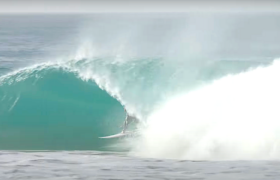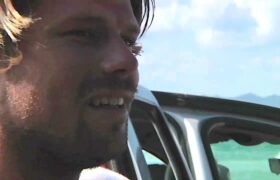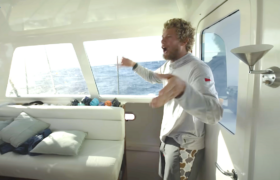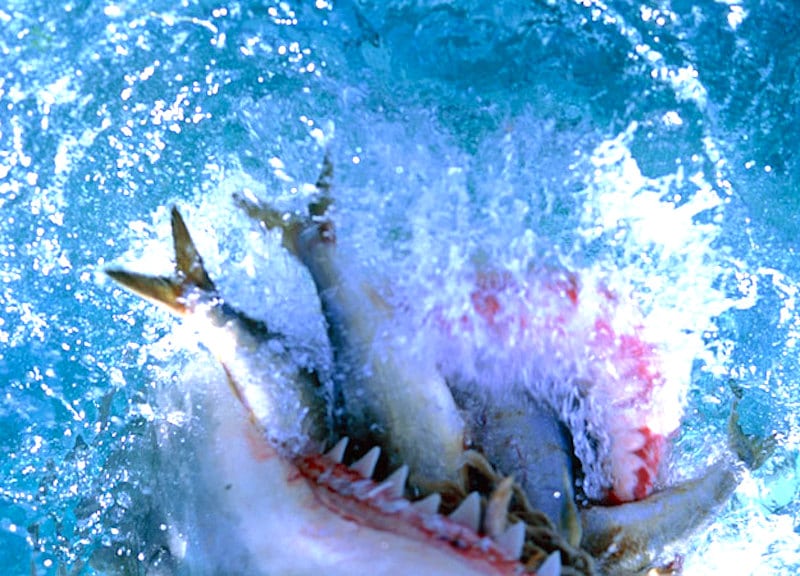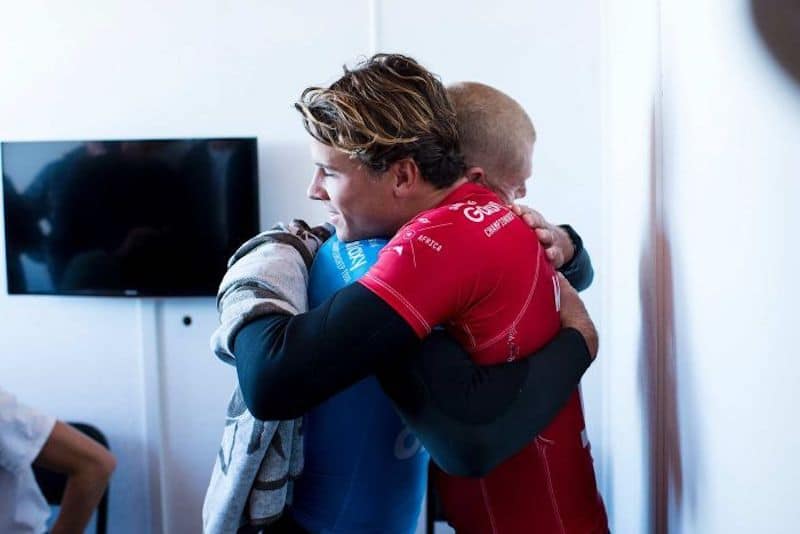Surfboards hidden under blackberry bushes, being chased by unmarked cars, lineups patrolled by predatory carrion crows. Life as a lockdown runner in southwest France.
“With the money from her accident, She bought herself a mobile home,
So at least she could get some enjoyment, Out of being alone”
But rather than a criticism, it was admiration. Gladwell points out how easy it is to make someone laugh, compared with cry.
Meanwhile, with mainland Europe on lockdown, everyone is urging each other to stay positive.
Surf fit Facebook lives. Yoga for kids. Book recommendations. Wim Hof YouTubes. How to meditate.
Broadly, “We got this.”
Last Friday’s spring equinox was the fourth day of lockdown, confinement total in France.
The last time armed men imposed curfew here, the 3rd SS Panzer Division Totenkopf were patrolling Bayonne.
The waves pumped for the first few days, pretty much as good as it gets. Offshore winds puffed lovingly all day, air temps soared around the low twenties, moderate tides kept everything right on the button.
Meanwhile, near total silence prevailed. Birdsong dominates the soundscape, with the recent arrivals from Africa, the hoopoes, bolding heralding the glorious arrival of spring.
Hours after the lockdown came in, an Aussie friend surfed perfect La Graviere with nobody out.
Not a soul.
Surely not performed since Dora or Maurice pretty much had free run of the joint.
He boasted his exploits on a surfboard factory’s WhatApp group. He got roundly chastised by colleagues – core surfers all –for playing fast and loose with pensioners’ lives.
Initially, there was some ambiguity as to whether or not surfing was actually allowed. President Macron said we could leave home briefly to do sport on our own.
So… surf alone?
Great.
As the lockdown came into force at noon last Tuesday, Gendarmes cleared the busy lineup at Capbreton and told the unlucky shredders that because of all the people in the lineup, surfing wasn’t an individual sport.
So then, if you paddled out and claimed a peak, would it therefore be illegal for anyone to paddle out and nause you?
Legally enforced lineup exclusivity, kind of Cloudbreak pre 2010, only without the predatory capitalist-backed thuggery?
Alas, not so.
Surfing was officially forbidden a couple of days later, along with beach going of any kind.
Fines of €135 euro were dished out to everyone in a wetsuit in the car park at Les Bourdaines. There were rumours of a San Sebastian local over the border in Spain copping a whopping €1000 for surfing Playa Gros.
If you’ve ever seen the quality of the waves at Playa Gros, a tenner would be considered steep.
But the main deterrent isn’t so much the criminal justice system, but the court of social media and its nurses crying after finishing a forty-eight-hour shift and not being able to buy pasta or wipe their bums.
The guy from the surfboard factory even left the WhatsApp group. Things were getting ugly alright.
Another friend was undeterred.
He got up early, biked into the woods and surfed himself silly in a hissing four-to-six left shories. Hid the five-eleven under a blackberry bush, biked back through the woods without seeing a soul.
The next day he went a bit earlier to avoid the street lights, which come on at six am for an hour before sun up, and got into the woods unlit, using backroads.
At one point, a car turned in a cul-de-sac and chased him.
He sprinted, made a few rapid turns, then lost them down an alley, schoolboy style.
What a rush.
The third day of lockdown was a darker night.
All alone in the woods, he started to think about wild boars. He’d seen them on this trail a few times, and a week earlier a friendly old madame, warned of a mother with litter nearby. When they charge you, their tusks can sever the femoral artery. Word is, if you get between momma and little uns…
“One dark night he came home from the sea,
And put a hole in her body where no hole should be…”
Day four was six-to-eight, offshore all day. Ruler edged north-west swell, thick lines to the horizon.
With empty peaks everywhere, he reckoned he saw more empties spit that day than ever in his born days. Carrion crows lined the beach, more so than usual. A truly magnificent bird, underrated because of abundance, they’re so intelligent they can recognise human and crow faces.
There’s no way they didn’t know something was amiss.
As my friend got out the water, one was eyeing him up.
“If he rolls an ankle in the ferocious shorey and can’t make it up the steep berm…” it almost certainly thought, calculating which eyeball to peck out first for breakfast.
“When the world falls apart, some things stay in place,
Levi Stubbs’ tears run down his face.”
The wind arrived yesterday, the swell finally relented.
Someone is flying a drone over my neighbourhood, I’m middle fingering it.
Rumours are that the lockdown will be extended to forty-five days and the army will be deployed to patrol the streets.
The surfing fine is going up to a grand, someone said.
Someone else said three.
As if that wasn’t bad enough, turns out the Venice canal dolphins were fake news.
The Totenkopf SS blew up twenty ships in the Adour and shot three people with machine guns as they beat their retreat. They also blew up the Pont Lajus bridge in Capbreton that goes from town to the beach for good measure.
But they never did find the cases of 1928 Lafite Rothschild hidden in the cellar at Cafe de la Gare.
Every cloud, etc.
